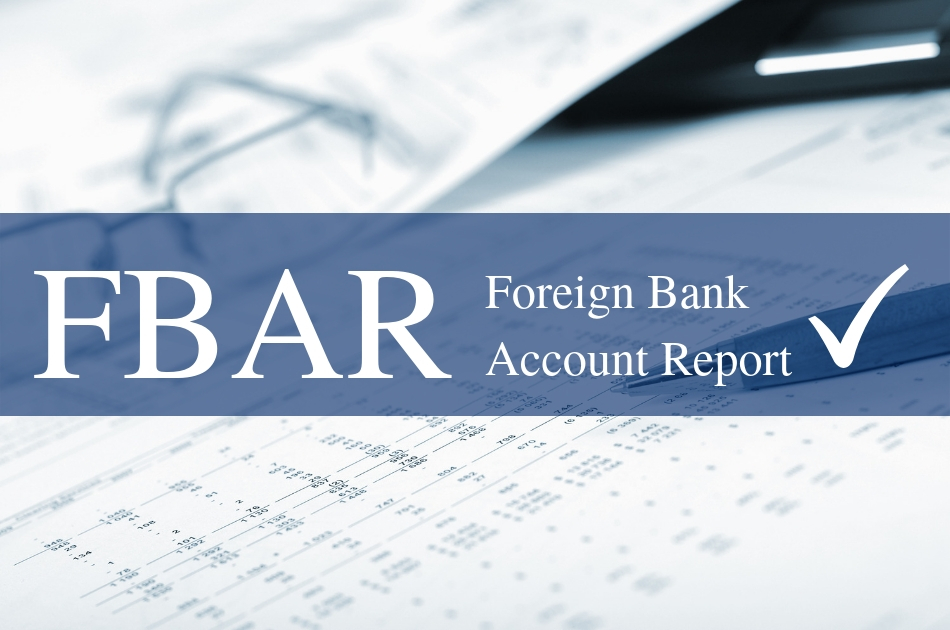Purpose of the FBAR
The FBAR is used by the United States government to identify persons who may be using foreign financial accounts to circumvent United States law. Information contained in FBARs can be used to identify or trace funds used for illicit purposes or to identify unreported income maintained or generated abroad.
Who Must File the FBAR?
A United States person is required to file an FBAR if that person has a financial interest in or signature authority over any financial account(s) outside of the United States and the aggregate maximum value of the account(s) exceeds $10,000 at any time during the calendar year.
• Example: John owns foreign financial accounts A, B and C with maximum account values of $3,000, $1,000 and $8,000, respectively. John is required to report accounts A, B and C because the aggregate value of the accounts is over $10,000. It does not matter that no single account exceeded $10,000.
Financial Accounts
Financial account includes the following types of accounts:
- Bank accounts such as savings accounts, checking accounts, and time deposits,
- Securities accounts such as brokerage accounts and securities derivatives or other financial instruments accounts,
- Commodity futures or options accounts,
- Insurance policies with a cash value (such as a whole life insurance policy),
- Mutual funds or similar pooled funds (i.e., a fund that is available to the general public with a regular net asset value determination and regular redemptions),
- Any other accounts maintained in a foreign financial institution or with a person performing the services of a financial institution.
o Example: A Canadian Registered Retirement Savings Plan (RRSP), Canadian Tax-Free Savings Account (TFSA), Mexican individual retirement accounts (Fondos para el Retiro) and Mexican Administradoras de Fondos para el Retiro (AFORE) are foreign financial accounts reportable on the FBAR.
Maximum Account Value
The maximum value of an account is a reasonable approximation of the greatest value of currency or nonmonetary assets in the account during the calendar year. Periodic account statements may be relied upon to determine the maximum value of the account, provided that the statements fairly reflect the maximum account value during the calendar year.
How to determine the maximum value of a foreign financial account:
Determine the maximum account value in the currency of the account. After the maximum value of the account is determined, convert the maximum account value for each account into United States dollars using the exchange rate on the last day of the calendar year.
Financial Interest
The following are considered financial interest in a foreign account:
1. The United States person is the owner of record or holder of legal title, regardless of whether the account is maintained for benefit of the United States person or for the benefit of another person, including non-United States persons.
2. The owner of record or holder of legal title is a person acting as an agent, nominee, attorney, or a person acting on behalf of the United States person with respect to the account.
3. The owner of record or holder of legal title is a corporation in which a United States person owns directly or indirectly: (i) more than 50 percent of the total value of shares of stock; or (ii) more than 50 percent of the voting power of all shares of stock.
4. The owner of record or holder of legal title is a trust in which the United States person has a greater than 50 percent present beneficial interest in the assets or income of the trust for the calendar year.
Signature Authority
Signature authority is the authority of an individual (alone or in conjunction with another individual) to control the disposition of assets held in a foreign financial account.
• Example: Megan, a United States resident, has a power of attorney on her elderly parents’ accounts in Canada, but she has never exercised the power of attorney. Megan is required to file an FBAR if the power of attorney gives her signature authority over the financial accounts. Whether or not the authority is ever exercised is irrelevant to the FBAR filing requirement.
Reporting Jointly Held Accounts
If two persons jointly maintain a foreign financial account, or if several persons each own a partial interest in an account, then each United States person has a financial interest in that account and each person must report the entire value of the account on an FBAR.
Penalties
Failure to file an FBAR when required to do so may result in civil penalties, criminal penalties, or both.
Due Date:
The FBAR is a calendar year report and must be received by the Department of Treasury on or before October 15 of the year following the calendar year being reported. If a filer does not have all the available information to file the return by October 15, the filer should file as complete a return as possible and amend the report when additional or new information becomes available.
Tax Partners can HELP you! Contact us at [email protected] or by phone at 905-836-8755.

